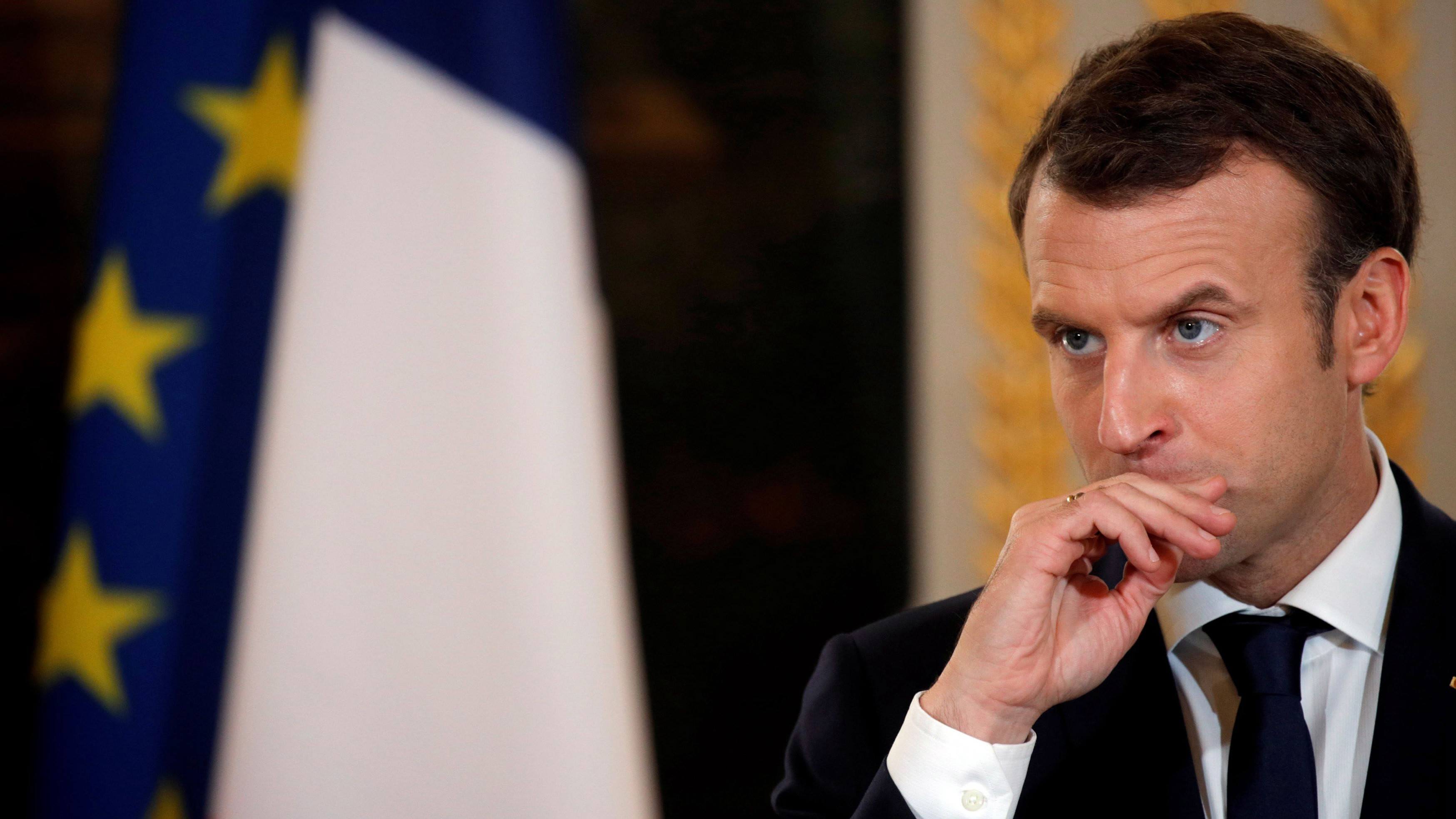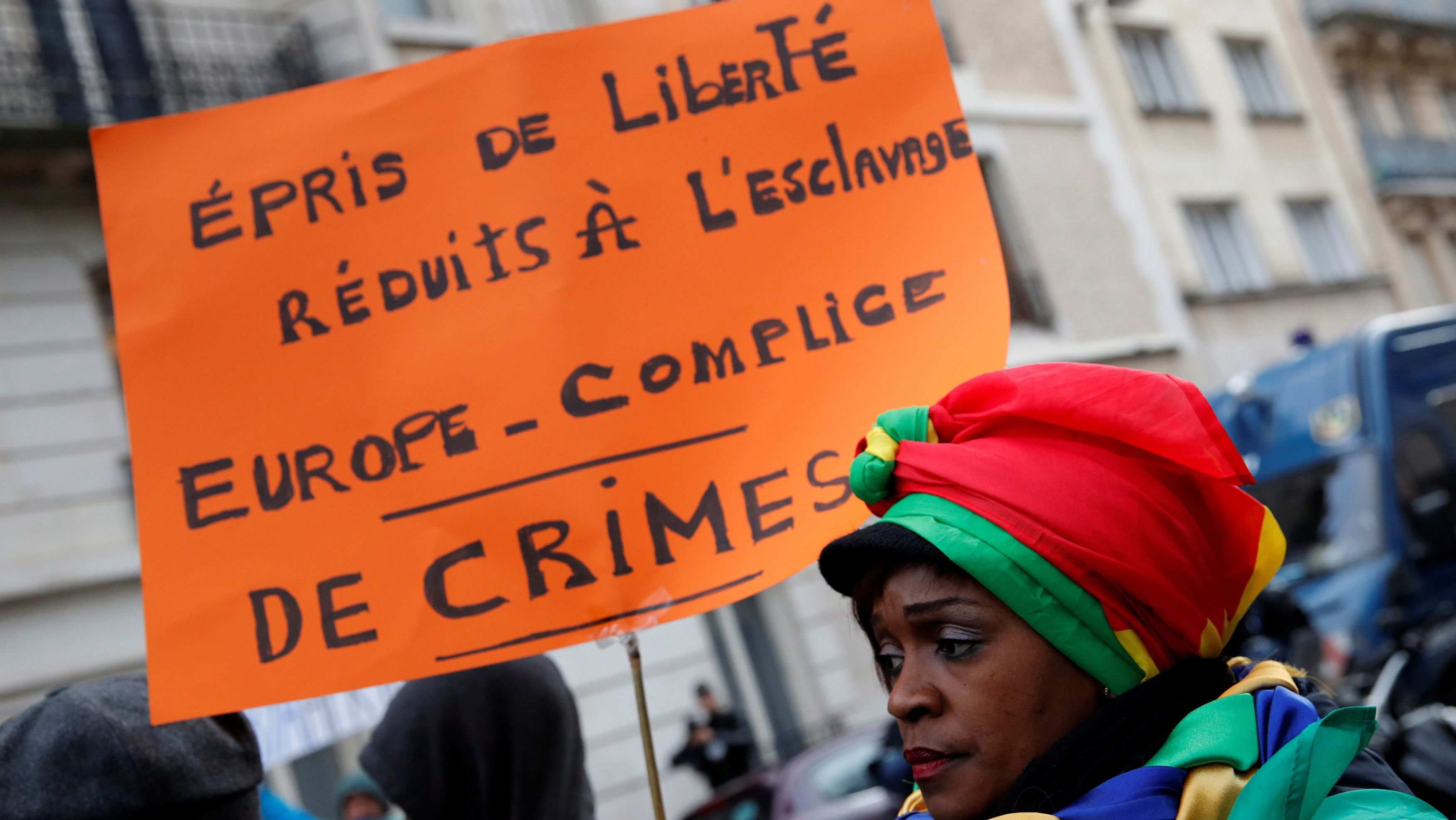
Politics
16:06, 27-Nov-2017
Macron targets Africa’s youth on trip to ‘continent of the future’
By John Goodrich

French President Emmanuel Macron will travel to Burkina Faso on Monday at the start of a three-nation tour of Africa during which he is expected to attempt to reinvigorate France’s faltering ties with the continent and find new ways to address the migration crisis.
Macron’s third trip to Africa since entering the Élysée Palace in May is part of an effort to re-engage a continent on which colonial legacies have cast a shadow over ties and powers such as China have invested heavily.

A woman holds a placard with the message "Loving Freedom, reduced to slavery.
Europe is an accomplice to crimes" as she attends a protest against slavery in
Libya outside the Lybian Embassy in Paris on November 24. /Reuters Photo
A woman holds a placard with the message "Loving Freedom, reduced to slavery. Europe is an accomplice to crimes" as she attends a protest against slavery in Libya outside the Lybian Embassy in Paris on November 24. /Reuters Photo
“Africa is not just the continent of migration and crises,” Macron said in August. “It’s a continent of the future.”
However, the legacies of France’s colonial past and some controversial statements from Macron – in a July speech, the 39-year-old president said Africa had "civilizational" problems – have raised eyebrows on the continent and demonstrations have been called to coincide with the visit.
On the agenda
Over four days in Burkina Faso, Cote d'Ivoire and Ghana, he is expected to focus on education, the digital economy and the environment, while migration and human trafficking are set to be high on the agenda at the African Union-EU summit in Cote d'Ivoire.
However, numerous other issues – from protests to counter-terror – are likely to grab headlines.
Slave auctions
Protests have taken place outside Libyan embassies across the world since CNN aired footage in mid-November of an apparent auction where black men were presented to North African buyers and sold off for 400 US dollars.
France called on November 22 for an emergency UN Security Council meeting over slave auctions, which Macron denounced as “scandalous” and “unacceptable.”
Given that France was at the forefront of the successful effort to oust Muammar Gaddafi as Libyan leader in 2011, some see Paris as having a responsibility for the subsequent instability in the North African country.
Discussions about the slave auctions are expected to feature prominently at the African Union-European Union Summit in Abidjan, Cote d’Ivoire on November 29-30.
Migration crisis
The plight of Africans seeking a route to Europe via Libya is set to be a focus for Macron, who is expected to link a message of empowerment for young people with tackling the migration crisis.
Around 400,000 migrants are currently thought to be trapped in Libya, seeking a new life in Europe but unable to afford or take the risk of a treacherous Mediterranean crossing.
Macron is keen to limit the flow of migrants to Europe by introducing tighter checks and controls on African soil rather than in Europe.
Counter-terror force
The French president, fresh from successfully pushing proposals for a joint EU defense force, is seeking to gather further support for a five-nation counter-terror force in the Sahel.
He wants to tackle militancy in the region stretching from Senegal in the west to Eritrea on the east, and has been instrumental in the advancement of the G5 Sahel Force which includes soldiers from Burkina Faso, Mali, Mauritania, Chad and Niger.
In July, Macron announced that France would contribute nine million US dollars annually to the force. He is urging European countries to support the military force and coordinate efforts to stop people smuggling from countries such as Libya.
France is already militarily involved in the region, with around 4,000 troops stationed in Mali to fight to against Islamic militancy. There is also a 12,000-strong UN peacekeeping mission in the Sahel.
Trade and aid
France has invested heavily in Ghana over recent years, primarily in the oil, telecoms and technology sectors, and is being urged to increase investment rather than aid across the continent. Macron is expected to emphasize entrepreneurship during his trip.
The French president will lay the foundation stone of the Abidjan metro while in Cote d’Ivoire, a project being undertaken by French-Korean consortium Bouygues-Dongsan and supported by a 1.4-billion-euro French loan.
Macron has promised to raise France’s aid budget from 0.38 percent of GDP to 0.55 percent by 2022.
Meanwhile, Europe is seeking new ways to work with Africa; the European Union is working on a new Africa strategy, while Germany is promoting a “Marshall Plan with Africa.”
Youth appeal vs suspicions
Macron will emphasize education and investment in youth during a speech at Ouagadougou University in Burkina Faso on Tuesday. He has also set up an advisory council of dual-nationals to help him formulate new policies that appeal to young Africans.
However, according to GhanaWeb, demonstrations have been called to protest "plundering" of the country's natural resources by French companies, the enduring French military presence on the continent and the continued existence of the CFA franc.
France is also viewed with suspicion in Burkina Faso over its role in helping former President Blaise Compaore flee to Côte d'Ivoire during a popular uprising in 2014, and Burkina Faso is seeking the extradition from France of the former president’s younger brother in connection with the murder of a newspaper publisher in 1998.

SITEMAP
Copyright © 2018 CGTN. Beijing ICP prepared NO.16065310-3
Copyright © 2018 CGTN. Beijing ICP prepared NO.16065310-3